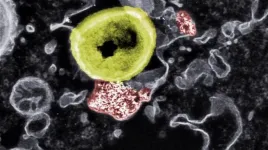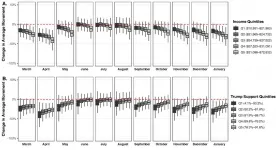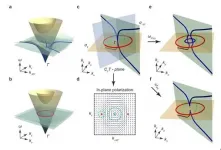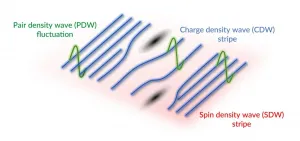How we know whether and when to pay attention
Fast reactions are based on estimates of whether and when events will occur
2021-04-22
(Press-News.org) Fast reactions to future events are crucial. A boxer, for example, needs to respond to her opponent in fractions of a second in order to anticipate and block the next attack. Such rapid responses are based on estimates of whether and when events will occur. Now, scientists from the Max Planck Institute for Empirical Aesthetics (MPIEA) and New York University (NYU) have identified the cognitive computations underlying this complex predictive behavior.
How does the brain know when to pay attention? Every future event carries two distinct kinds of uncertainty: Whether it will happen within a given time span, and if so, when it will likely occur. Until now, most research on temporal prediction has assumed that the probability of whether an event will occur has a stable effect on anticipation over time. However, this assumption has not been empirically proven. Furthermore, it is unknown how the human brain combines the probabilities of whether and when a future event will occur.
An international team of researchers from MPIEA and NYU has now investigated how these two different sources of uncertainty affect human anticipatory behavior. Using a simple but elegant experiment, they systematically manipulated the probabilities of whether and when sensory events will occur and analyzed human reaction time behavior. In their recent article in the journal Proceedings of the National Academy of Sciences (PNAS), the team reports two novel results. First, the probability of whether an event will occur has a highly dynamic effect on anticipation over time. Second, the brain's estimations of whether and when an event will occur take place independently.
"Our experiment taps into the basic ways we use probability in everyday life, for example when driving our car," explains Matthias Grabenhorst of the Max Planck Institute for Empirical Aesthetics. "When approaching a railroad crossing, the probability of the gates closing determines our overall readiness to hit the brakes. This is intuitive and known."
Georgios Michalareas, also MPIEA, adds: "We found, however, that this readiness to respond drastically increases over time. You become much more alert, although the probability of the gates closing objectively does not change." This dynamic effect of whether an event will occur is independent of when it will happen. The brain knows when to pay attention based on independent computations of these two probabilities.
The research team's findings indicate that the human brain dynamically adjusts its readiness to respond based on separate probability estimates of whether and when events occur. The results of this study add significantly to our understanding of how the human brain predicts future events in order to interact accordingly with the environment.
INFORMATION:
Original publication
Matthias Grabenhorst, Laurence T. Maloney, David Poeppel and Georgios Michalareas (2021): Two sources of uncertainty independently modulate temporal expectancy. Proceedings of the National Academy of Sciences 118(16), e2019342118.
doi:10.1073/pnas.2019342118
[Attachments] See images for this press release:
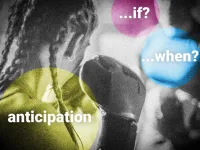
ELSE PRESS RELEASES FROM THIS DATE:
2021-04-22
COLUMBUS, Ohio - In the continuing search for dark matter in our universe, scientists believe they have found a unique and powerful detector: exoplanets.
In a new paper, two astrophysicists suggest dark matter could be detected by measuring the effect it has on the temperature of exoplanets, which are planets outside our solar system.
This could provide new insights into dark matter, the mysterious substance that can't be directly observed, but which makes up roughly 80% of the mass of the universe.
"We believe there should be about 300 billion exoplanets that are waiting to be discovered," said Juri Smirnov, a fellow at The Ohio ...
2021-04-22
In the arms race "mankind against bacteria", bacteria are currently ahead of us. Our former miracle weapons, antibiotics, are failing more and more frequently when germs use tricky maneuvers to protect themselves from the effects of these drugs. Some species even retreat into the inside of human cells, where they remain "invisible" to the immune system. These particularly dreaded pathogens include multi-resistant staphylococci (MRSA), which can cause life-threatening diseases such as sepsis or pneumonia.
In order to track down the germs in their hidouts and eliminate them, a team of researchers from Empa and ETH Zurich is now developing nanoparticles that use a completely different mode ...
2021-04-22
BOSTON - For many patients with localized lung cancer (non-small-cell lung carcinoma and small cell lung carcinoma), high-dose radiation with concurrent chemotherapy is a potential cure. Yet this treatment can cause severe, acute inflammation of the esophagus (esophagitis) in about one in five patients, requiring hospitalization and placement of a feeding tube.
A team of radiation oncologists at Mass General Cancer Center demonstrate in an early clinical trial that the radiation beam can be carefully "sculpted" to deliver the majority of a radiation dose directly to the tumor while effectively sparing tissues in the side of the ...
2021-04-22
Ann Arbor, April 22, 2021 - Using nearly a year of anonymous geolocation data from 15-17 million cell phone users in 3,037 United States counties, investigators have found that individuals with lower income per capita or greater Republican orientation were associated with significantly reduced social distancing throughout the study period from March 2020 through January 2021. Their findings are reported in the American Journal of Preventive Medicine, published by Elsevier.
The associations persisted after adjusting for a variety of county-level demographic and socioeconomic characteristics. Other county-level characteristics, such as the share of Black and Hispanic residents, were also associated ...
2021-04-22
Topological photonics has attracted a lot of attention recently. The application of topological band theory to photonics not only opens the door to novel devices, but also stimulates the exploration of new topological phases. In the photonic regime, symmetries that are unique to electromagnetic (EM) waves can intrinsically protect the band degeneracies in the momentum space. Topological systems realized using such symmetries are uniquely "photonic", having no counterparts in electronic or phononic systems.
Among various topological features in momentum space, nodal chain is a special ...
2021-04-22
Guilt and social pressure lead people to underreport COVID-19 protocol violations, according to study of experimental data across 12 countries.
Article Title: A guilt-free strategy increases self-reported non-compliance with COVID-19 preventive measures: Experimental evidence from 12 countries
Funding: J.-F. Daoust acknowledges the financial support from SSPS Open Access (University of Edinburgh). M. Foucault and S. Brouard acknowledge the financial support from ANR - REPEAT grant (Special COVID-19), CNRS, Fondation de l'innovation politique, as well as regions Nouvelle-Aquitaine and Occitanie. Richard Nadeau and Éric Bélanger acknowledge the financial support from the Social Sciences and Humanities Research Council (SSHRC/CRSH). M. Becher gratefully acknowledges ...
2021-04-22
Unconventional superconductors contain a number of exotic phases of matter that are thought to play a role, for better or worse, in their ability to conduct electricity with 100% efficiency at much higher temperatures than scientists had thought possible - although still far short of the temperatures that would allow their wide deployment in perfectly efficient power lines, maglev trains and so on.
Now scientists at the Department of Energy's SLAC National Accelerator Laboratory have glimpsed the signature of one of those phases, known as pair-density waves or PDW, and confirmed that it's intertwined with another phase known as charge density wave (CDW) stripes - wavelike patterns of higher and lower ...
2021-04-22
Substantial proportions of pregnant and postpartum women scored high for symptoms of anxiety, depression, loneliness and post-traumatic stress in relation to COVID-19 in a survey carried out in May and June 2020, according to a new study published this week in the open-access journal PLOS ONE by Karestan Koenen and Archana Basu of Harvard T.H. Chan School of Public Health, US, and colleagues.
Pregnant and postpartum women face unique challenges during the COVID-19 pandemic that may put them at elevated risk of mental health problems. These include concerns about ...
2021-04-22
Time seems to pass more slowly in the UK COVID-19 lockdown - especially for people who are depressed, shielding or dissatisfied with social interactions
INFORMATION:
Article Title: Distortions to the passage of time during England's second national lockdown: A role for depression
Funding: The author received no specific funding for this work.
Competing Interests: The authors have declared that no competing interests exist.
Article URL: https://journals.plos.org/plosone/article?id=10.1371/journal.pone.0250412
...
2021-04-22
Survey of 3,536 healthcare workers suggests 67 percent are suffering burnout, but people who receive frequent COVID-19 tests are less likely to be burned out.
INFORMATION:
Article Title: Determinants of burnout and other aspects of psychological well-being in healthcare workers during the Covid-19 pandemic: A multinational cross-sectional study
Funding: JK has received an educational grant from Johnson and Johnson.
Competing Interests: JK has received an educational grant from Johnson and Johnson. This does not alter our adherence to PLOS ONE ...
LAST 30 PRESS RELEASES:
[Press-News.org] How we know whether and when to pay attention
Fast reactions are based on estimates of whether and when events will occur

